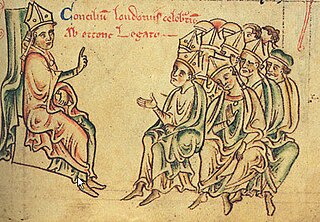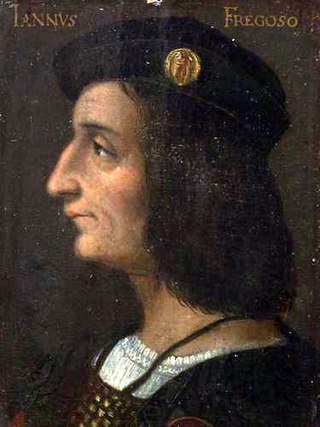
Pope Adrian V, born Ottobuono de' Fieschi, was the head of the Catholic Church and ruler of the Papal States from 11 July 1276 to his death on 18 August 1276. He was an envoy of Pope Clement IV sent to England in May 1265 who successfully completed his task of resolving disputes between King Henry III of England and his barons. Adrian V was elected pope following the death of Innocent V, but died of natural illness before being ordained to the priesthood.

Pope Celestine IV, born Goffredo da Castiglione, was head of the Catholic Church and ruler of the Papal States for only a few days from 25 October 1241 to his death in 10 November 1241.

Pope Gregory X, born Teobaldo Visconti, was head of the Catholic Church and ruler of the Papal States from 1 September 1271 to his death and was a member of the Secular Franciscan Order. He was elected at the conclusion of a papal election that ran from 1268 to 1271, the longest papal election in the history of the Catholic Church.

Pope Innocent IV, born Sinibaldo Fieschi, was head of the Catholic Church and ruler of the Papal States from 25 June 1243 to his death in 1254.

Pope Nicholas III, born Giovanni Gaetano Orsini, was head of the Catholic Church and ruler of the Papal States from 25 November 1277 to his death on 22 August 1280.
William of Modena, also known as William of Sabina, Guglielmo de Chartreaux, Guglielmo de Savoy, Guillelmus, was an Italian clergyman and papal diplomat. He was frequently appointed a legate, or papal ambassador by the popes Honorius III and Gregory IX, especially in Livonia in the 1220s and in the Prussian questions of the 1240s. Eventually he resigned his see to devote himself to these diplomatic issues. On 28 May 1244 he was created Cardinal-Bishop of Sabina by Pope Innocent IV. For a short time (1219–1222) he served also as Vice-Chancellor of the Holy Roman Church.

The Archdiocese of Genoa is a Latin Church ecclesiastical territory or diocese of the Catholic Church in Italy. Erected in the 3rd century, it was elevated to an archdiocese on 20 March 1133. The archdiocese of Genoa was, in 1986, united with the Diocese of Bobbio-San Colombano, forming the Archdiocese of Genoa-Bobbio; however a split in 1989 renamed it the "Archdiocese of Genoa."

The 1268–71 papal election, following the death of Pope Clement IV, was the longest papal election in the history of the Catholic Church. This was due primarily to political infighting between the cardinals. The election of Teobaldo Visconti as Pope Gregory X was the first example of a papal election by "compromise", that is, by the appointment of a committee of six cardinals agreed to by the other remaining ten. The election occurred more than a year after the magistrates of Viterbo locked the cardinals in, reduced their rations to bread and water, and removed the roof of the Palazzo dei Papi di Viterbo where the election took place.

Stephen (I) Báncsa was the first Hungarian cardinal of the Roman Catholic Church. Prior to that, he served as Bishop of Vác from 1240 or 1241 to 1243, then Archbishop of Esztergom from 1242 until his creation as cardinal.

Giorgio Fieschi was an Italian cardinal, of the counts of Lavagna.

Otto of Tonengo was an Italian papal diplomat and cardinal, first as deacon of San Nicola in Carcere from 1227 and then as bishop of Porto e Santa Rufina from 1244.
The 1254 papal election took place following the death of Pope Innocent IV and ended with the choice of Raynaldus de' Conti, who took the name Pope Alexander IV. The election was held in Naples, in the former palazzo of Pietro della Vigna, and required only one day.

Ottaviano Fregoso was the Doge of the Republic of Genoa.
Opizzo Fieschi, also known as Opizo or Opiso dei' Fieschi, was a 13th-century Italian cleric from the powerful Genovese Fieschi family. Following his uncle Sinibaldo's election as Pope Innocent IV, Opizzo was appointed the Catholic Church's patriarch of Antioch.
Ludovico Fieschi was a cardinal during the Western Schism.
Guglielmo Boccanegra was a Genoese statesman, the first capitano del popolo of the Republic of Genoa, from 1257 to 1262, exercising a real lordship, assisted in the government by a council of 32 elders.

Battista Fregoso was the 40th Doge of the Republic of Genoa.

Philip of Tripoli, sometimes Philippus Tripolitanus or Philip of Foligno, was an Italian Catholic priest and translator. Although he had a markedly successful clerical career, his most enduring legacy is his translation of the complete Pseudo-Aristotelian Secretum secretorum from Arabic into Latin around 1230.
Enrico da Settala, sometimes anglicized Henry of Settala, was the archbishop of Milan from 1213 until his death.

Luca Fieschi was a Genoese nobleman and Roman Catholic cardinal from 1300.













